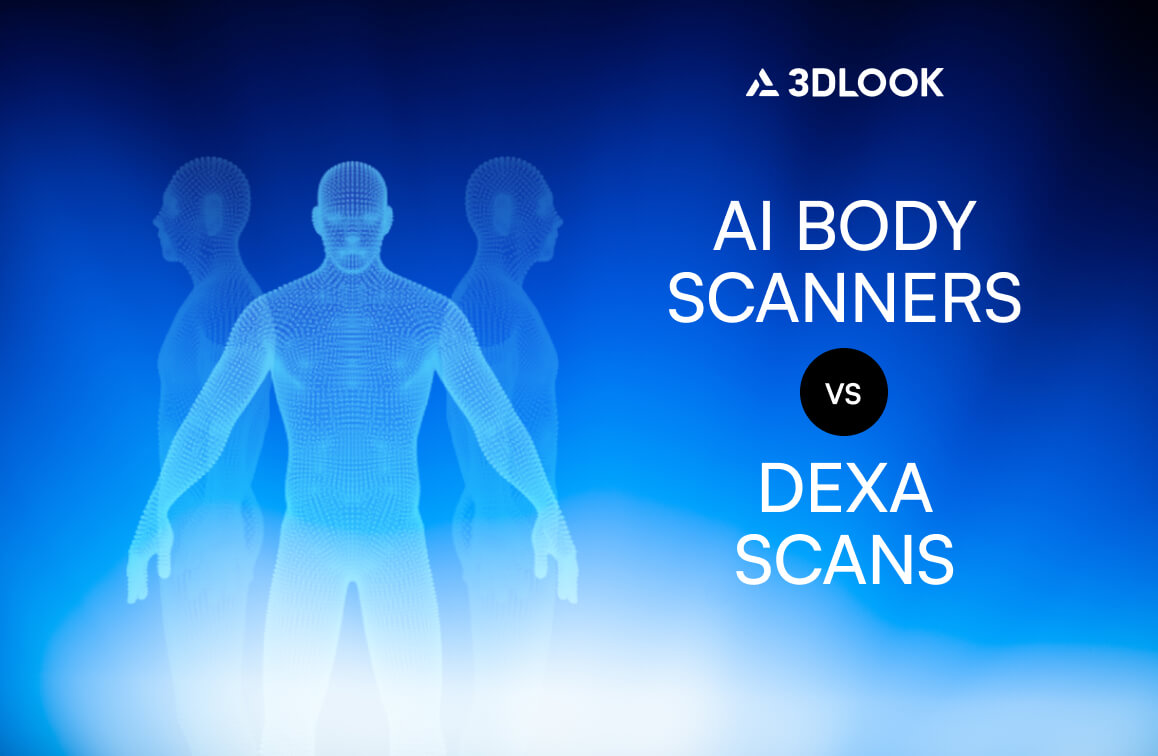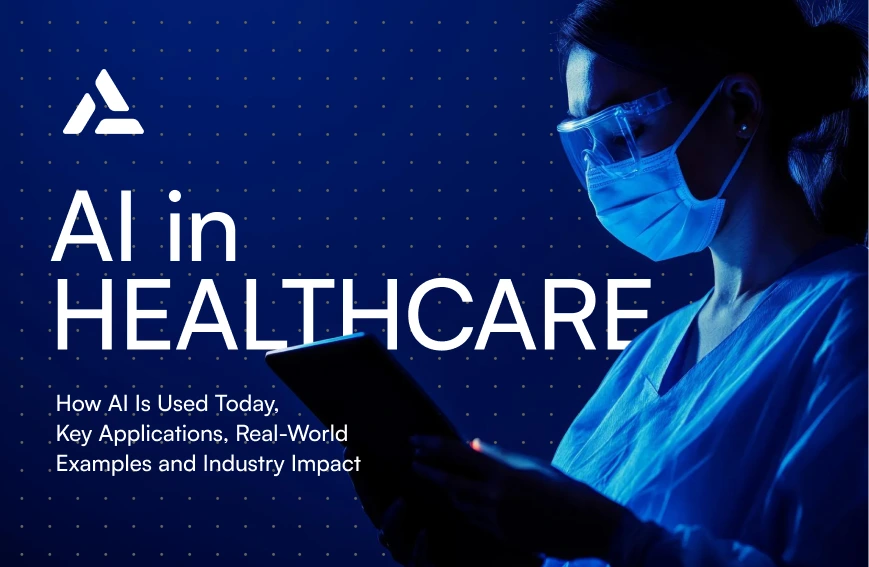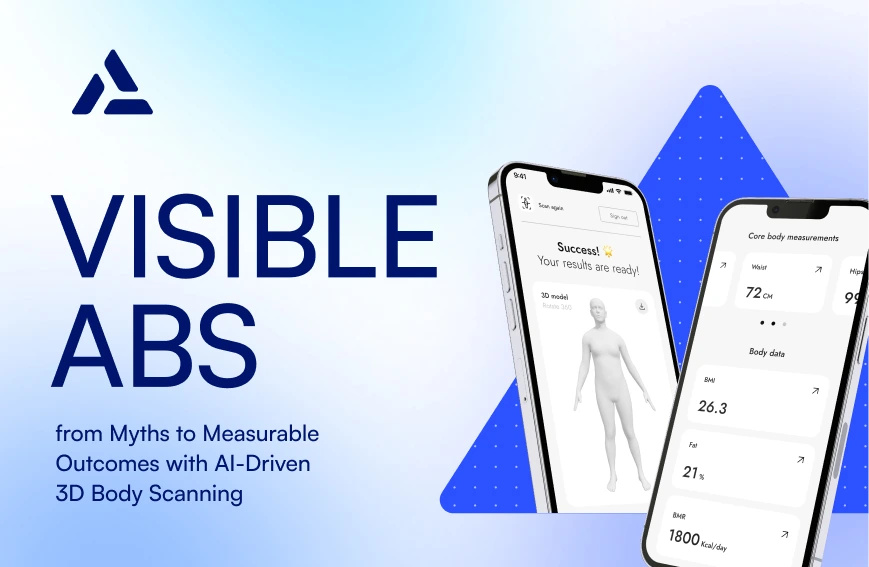The global body composition analysis market is experiencing unprecedented growth, projected to reach $4.8 billion by 2027 as consumers and healthcare providers increasingly demand precise, actionable health data. Another projection puts the market at $535.6 million in 2023, with a forecast to reach $935.8 million by 2032. The COVID-19 pandemic accelerated adoption of at-home health monitoring solutions, while simultaneously highlighting the importance of metabolic health in disease prevention.
Today, two technologies dominate the landscape of body composition analysis: AI-powered 3D body scanners and clinical-grade DEXA scans. But which technology delivers superior insights for your specific needs?
AI-Powered 3D Body Scanners: The Future of Accessible Health Monitoring
AI-powered 3D body scanners represent a revolutionary fusion of computer vision, photogrammetry, and machine learning algorithms. These systems capture hundreds of body measurements using standard smartphone cameras or specialized 3D sensors, then apply artificial intelligence to predict body composition metrics with remarkable accuracy.
How the Technology Works: The scanning process begins with photogrammetry – capturing multiple 2D images from different angles to create a precise 3D model. Advanced computer vision algorithms identify anatomical landmarks and extract over 400 body measurements. Machine learning models, trained on thousands of validated datasets, then predict body fat percentage, muscle mass, and other composition metrics based on these dimensional relationships.
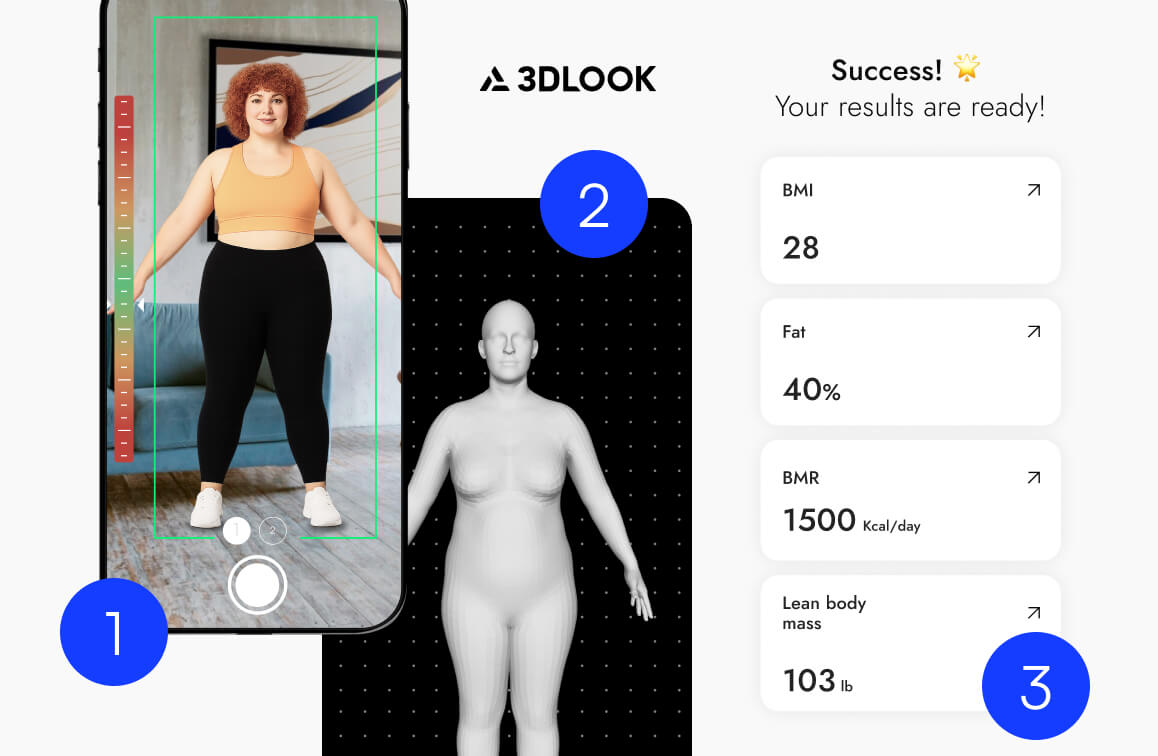
Key Technical Capabilities:
- Measurement Accuracy: 96-97% precision for body circumferences and dimensions
- Weight Prediction: Average error margin of just 3.5%
- Processing Speed: Complete analysis in under 5 minutes
- Safety Profile: Completely radiation-free with no health contraindications
- Accessibility: Smartphone-compatible with minimal hardware requirements
Real-World Applications: Modern AI body scanners extend far beyond basic fitness tracking. They’re increasingly deployed in virtual tailoring for e-commerce, metabolic health risk assessment in preventive medicine, and longitudinal research studies. The Mayo Clinic’s groundbreaking research demonstrated that AI-enhanced 3D scans can predict metabolic syndrome risk more accurately than traditional BMI or waist-hip ratio measurements.
DEXA Scans: The Clinical Gold Standard
Dual-Energy X-ray Absorptiometry (DEXA) has served as the clinical gold standard for body composition analysis for over three decades. This technology employs two low-dose X-ray beams of different energy levels to differentiate between bone mineral, lean tissue, and adipose tissue with exceptional precision.
The Physics Behind DEXA: DEXA scanners emit X-rays at two distinct energy levels (typically 40 and 70 keV). Different tissues absorb these energies at predictable rates – bone absorbs more high-energy radiation, while soft tissues preferentially absorb lower-energy beams. Advanced algorithms analyze these absorption patterns to calculate precise tissue composition.
Clinical-Grade Precision:
- Bone Density: 1-2% error margin, essential for osteoporosis diagnosis
- Regional Analysis: Detailed breakdown by anatomical region (arms, legs, trunk, android/gynoid fat distribution)
- Visceral Fat Assessment: Quantification of dangerous abdominal adiposity
- Radiation Exposure: Minimal dose – approximately 1/10th of a standard chest X-ray
Medical Applications: DEXA scans are indispensable in clinical settings for osteoporosis screening, monitoring bone health in cancer patients, assessing sarcopenia in elderly populations, and providing precise body composition data for research studies. Elite athletes rely on DEXA for optimizing training regimens and monitoring seasonal body composition changes.
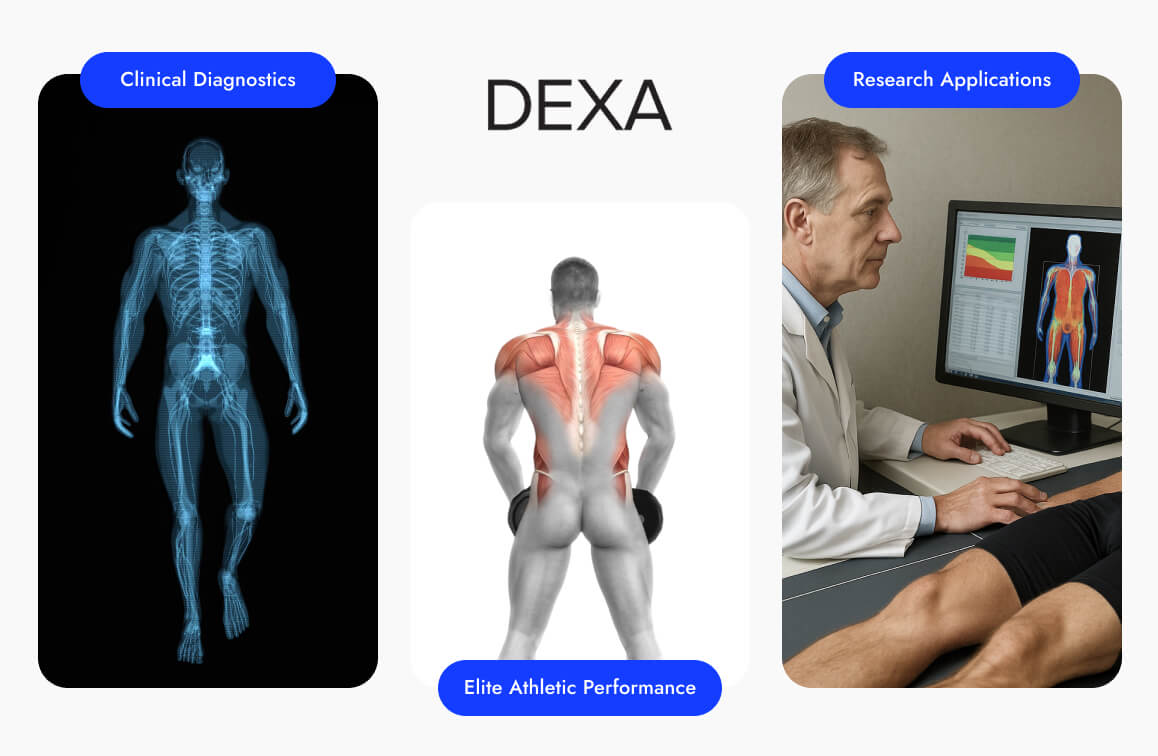
Technology Comparison
| Metric | AI 3D Body Scanners | DEXA Scans |
| Accuracy | 96-97% for measurements, 3.5% weight error | 1-2% error for bone density, gold standard precision |
| Safety | Completely radiation-free | Low-dose radiation (~0.001 mSv) |
| Speed | 2-5 minutes total | 10-30 minutes including setup |
| Cost per Scan | $5-50 (subscription model) | $150-500 per session |
| Accessibility | Smartphone-based, global availability | Clinical facilities, appointment required |
| Frequency | Daily/weekly monitoring possible | Recommended 1-2 times yearly |
| Data Output | Measurements, composition estimates, 3D visualization | Precise tissue composition, bone density, regional analysis |
| User Experience | Private, comfortable, app-integrated | Clinical setting, positioning requirements |
| Regulatory Status | Wellness device classification | FDA-approved medical device |
Strategic Use Case Analysis
When AI 3D Scanners Excel
Longitudinal Health Monitoring: AI scanners shine in applications requiring frequent, consistent tracking. A fitness enthusiast can monitor muscle gain and fat loss weekly without radiation exposure or significant cost. Corporate wellness programs can provide employees with regular health screenings, creating valuable longitudinal datasets for population health insights.
Consumer Integration: The seamless integration with smartphone apps and wearable devices makes AI scanners ideal for consumer health platforms. Users can correlate body composition changes with sleep patterns, exercise routines, and nutritional interventions, creating a comprehensive health picture.
When DEXA Remains Irreplaceable
Clinical Diagnostics: For diagnosing osteoporosis, assessing fracture risk, or monitoring bone health during cancer treatment, DEXA’s precision and medical validation remain unmatched. Healthcare providers require the regulatory approval and clinical evidence that only DEXA currently provides.
Elite Athletic Performance: Professional athletes and sports scientists demand the regional precision that DEXA offers. Understanding limb-specific muscle imbalances, tracking seasonal body fat fluctuations, or optimizing power-to-weight ratios requires DEXA’s detailed analysis capabilities.
Research Applications: Pharmaceutical trials, population health studies, and academic research often mandate the gold-standard precision and regulatory acceptance that DEXA provides. The extensive validation and standardization make DEXA irreplaceable in rigorous scientific contexts.
Revolutionary Case Study: Mayo Clinic’s AI Innovation
The Mayo Clinic’s groundbreaking research represents a paradigm shift in preventive healthcare applications of AI body scanning technology. Their study, published in leading medical journals, demonstrated that AI-enhanced 3D body scans could predict metabolic syndrome risk with superior accuracy compared to traditional clinical measurements.
Study Methodology: Researchers analyzed over 3,000 participants using both traditional metrics (BMI, waist-hip ratio) and AI-powered 3D body scans. The AI algorithms, trained on validated metabolic health datasets, identified subtle body shape patterns invisible to conventional measurements.
Breakthrough Results: The AI system achieved 85% accuracy in predicting metabolic syndrome risk, significantly outperforming BMI (72% accuracy) and waist-hip ratios (78% accuracy). The mobile app integration (myBVI) demonstrated “excellent performance” in real-world clinical settings, suggesting practical implementation feasibility.
Healthcare Implications: This research validates AI body scanning as a legitimate tool for preventive medicine, potentially enabling early intervention for diabetes, cardiovascular disease, and metabolic disorders. The scalability and accessibility of AI scanners could democratize advanced health screening globally.
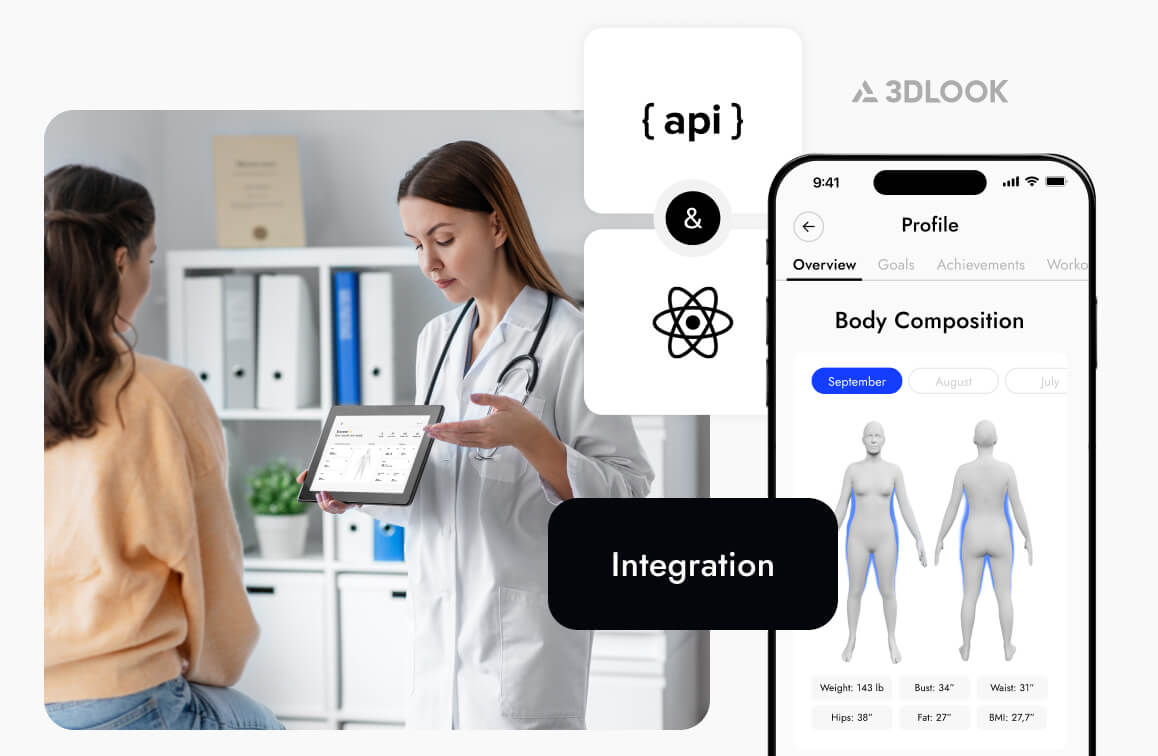
Integration and Implementation
For Healthcare Providers
Hybrid Approach: Progressive healthcare systems are implementing both technologies strategically—AI scanners for routine screening and patient engagement, DEXA for diagnostic confirmation and clinical decision-making. This approach maximizes efficiency while maintaining clinical standards.
Workflow Integration: Modern electronic health record systems can seamlessly integrate data from both platforms, creating comprehensive patient profiles that combine frequent AI-generated insights with periodic clinical-grade DEXA assessments.
For Fitness and Wellness Businesses
Member Engagement: Gyms and wellness centers are discovering that AI body scanners dramatically improve member retention by providing objective progress tracking. The ability to visualize body changes motivates continued engagement while generating valuable data for personalized programming.
Revenue Optimization: The subscription-based model of AI scanners offers predictable recurring revenue, while the objective data supports premium service offerings and personal training upsells.
For Technology Companies
API Integration: Modern AI scanning platforms offer robust APIs for seamless integration with existing health and fitness applications. This enables rapid deployment across diverse platforms without extensive development resources.
White-Label Solutions: Companies can brand AI scanning technology as their own, creating differentiated health and wellness offerings without the complexity of developing proprietary scanning algorithms.
Discover how AI-powered body data is revolutionizing health, fitness, and weight management, setting a new standard for personalization and progress tracking.
Cost-Benefit Analysis
Total Cost of Ownership
AI Scanning Implementation:
- Initial Setup: $10,000-50,000 for professional-grade systems
- Per-Scan Costs: $5-20 including software licensing
- Training Requirements: Minimal—typically 2-4 hours
- Maintenance: Software updates, minimal hardware servicing
DEXA Implementation:
- Equipment Investment: $100,000-300,000 for new systems
- Per-Scan Costs: $75-150 including technician time and facility overhead
- Training Requirements: Extensive—certified technician programs
- Maintenance: Regular calibration, service contracts, regulatory compliance
High-Volume Scenarios: For facilities conducting >100 scans monthly, AI systems typically achieve ROI within 6-12 months due to lower per-scan costs and reduced staffing requirements.
Clinical Applications: DEXA systems in medical settings often justify higher costs through insurance reimbursement and diagnostic accuracy requirements.
Privacy and Data Security Considerations
AI Scanners: Modern platforms implement end-to-end encryption, HIPAA-compliant data handling, and user-controlled data sharing preferences. The distributed nature of smartphone-based scanning can enhance privacy by keeping data on personal devices.
DEXA Systems: Clinical DEXA systems operate under strict medical privacy regulations with established protocols for data security and patient confidentiality.
Business Applications
Healthcare Providers: Consider hybrid implementation – AI scanners for patient engagement and routine screening, DEXA for diagnostic confirmation and clinical decision-making.
Fitness Industry: AI scanners offer superior member engagement, retention benefits, and revenue opportunities through frequent, affordable scanning options.
Corporate Wellness: AI technology enables scalable employee health screening programs with minimal healthcare infrastructure investment.
For Early Adopters: Implement AI scanning technology now to gain competitive advantages in member engagement, data collection, and service differentiation. The technology maturity and cost-effectiveness support immediate deployment.
For Clinical Applications: Maintain DEXA capabilities for diagnostic accuracy while exploring AI scanning for patient engagement and frequent monitoring applications.
For Technology Integration: Prioritize platforms with robust APIs, proven accuracy, and strong regulatory compliance frameworks to ensure long-term viability.
Final Thoughts
The comparison between AI body scanners and DEXA scans reveals not a winner-takes-all scenario, but rather two complementary technologies serving different but equally important roles in modern health and fitness monitoring.
AI body scanners excel in accessibility, frequency, and user engagement – making precise body composition analysis available to millions of users worldwide through smartphone technology. Their radiation-free operation, cost-effectiveness, and seamless integration with digital health platforms position them as the ideal solution for longitudinal health tracking and preventive wellness applications.
DEXA scans remain the clinical gold standard for diagnostic accuracy, bone health assessment, and medical decision-making. Their precision, regulatory approval, and comprehensive regional analysis capabilities make them irreplaceable in healthcare settings and elite athletic performance optimization.
